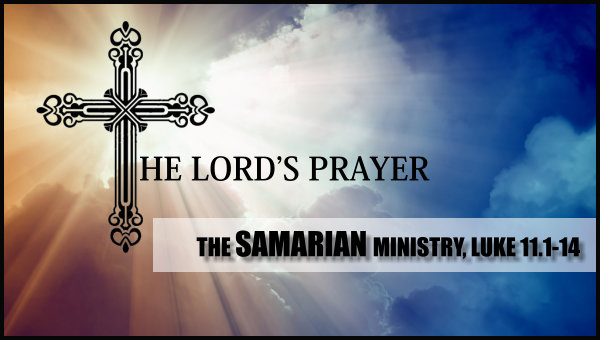By Tyson Thorne

The Samarian Ministry at Various Cities (9.51-18.34), 11.1-13
When one thinks of spiritual growth we have been trained to think in terms of two disciples, Bible study and prayer. While these are important, we at Think-Biblically.com have been trying to overcome this most basic train of thought. It is not enough to know Scripture and pray daily if it is merely a spiritual exercise. More important than these is building connections with God. This in no way is meant to diminish prayer in one’s life, however, as prayer is one way in which we can build that connection. Something we intend to prove by studying Jesus’ teaching on the subject.
There are two versions of the Lord’s Prayer (also called the “Our Father” prayer), the most well-known is from Matthew. Matthew’s is longer and provides more context for our understanding but the simplicity of Luke’s version is beautiful in its own right. Observe:
|
LUKE |
MATTHEW
|
|
Father, may your name be honored; |
Our Father in heaven, may your name be honored, |
|
may your kingdom come. |
may your kingdom come, may your will be done on earth as it is in heaven. |
|
Give us each day our daily bread, |
Give us today our daily bread, |
|
and forgive us our sins, |
and forgive us our debts, |
|
for we also forgive everyone who sins against us. |
as we ourselves have forgiven our debtors. |
|
And do not lead us into temptation. |
And do not lead us into temptation, |
The Lukan version starts out familiarly enough. The translation above removes the Old English word “hallowed” for its definition, “be honored.” The second phrase is obviously truncated, as is the final phrase. Otherwise the two are nearly identical. Mathew uses the familiar image of sin as a form of debt, whereas Luke prefers straightforward language. But our purpose here isn’t to compare and contrast the two author’s approaches, it is to understand how prayer connects us to God.
How many times have you repeated this prayer in church? How many times have you said it by memory without considering its meaning? Like the Parable of the Good Samaritan, it’s time to understand this passages’ deeper truths. Take the opening line for example. To whom are we praying? Are we praying to a lofty and angry God who can’t wait to lance us with a lightning bolt when we make a mistake? Far from it. The creator of the universe and of all life loves us enough to desire us to call him “Father”. May his name be honored indeed!
The center of Jesus’ message is that the kingdom of God is near. Jesus, the king of heaven, has come to fulfill prophecy and lead his people back into fellowship with a God who isn’t distant, but who is near enough to be touched. One of the prophecies from the Old Testament is about a day when God will live among men, and that is what the Feast of Tabernacles is all about. In that day God will set his tent among ours. By praying for the Kingdom to come we are giving our allegiance to the message of Jesus, and that connects us to God.
“Give us each day our daily bread” isn’t about God giving us everything we want, rather it reveals our dependence on God for our daily needs. When we recognize that everything we have is a result of God’s generosity, we build a connection of gratitude with him. That gratitude isn’t only for our home, our job, or our family, but gratitude for his willingness to forgive us our sins. By calling on God to forgive us, we are employing faith that he will forgive us. Faith pleases God and creates a connection point with him. Something else that pleases God and requires the application of faith, modeling God’s character by forgiving others.
The last phrase, “do not lead us into temptation” is a strange request in light of James 1.13, “Let no one say when he is tempted, ‘I am tempted by God,’ for God cannot be tempted by evil, and he himself tempts no one.” The meaning here is not that God would ever lead us into temptation, but rather that God would protect us from sin. By praying so we attest to our commitment to avoid sin and anything that would displease God. It is a statement of our loyalty to living righteously.
|
|
